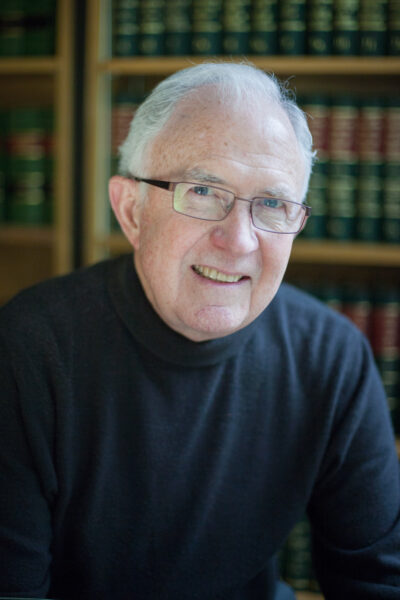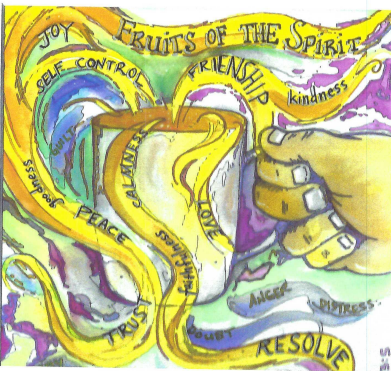“Fruit of The Spirit” watercolor by Nicola Beeson
Have you, the person you consciously or unconsciously want to protect, ever been afraid to undertake a task that has a potential outcome that could lead to pain, disappointment, or rejection by others? I think we would all agree this is a common experience from time to time. A relative of mine said to me that the hardest part of any task whose outcome is unsure is getting started.
I was raised in a protected family environment on a tobacco farm, at that time called a plantation, with workers and their families living in minimal houses provided on the place, about three miles outside of the small town of Havana, Florida. The population back then was approximately 2,000 and located just north of the State Capital of Tallahassee, Florida. My father was a successful farmer and served as a County Commissioner for many years. His temperament in personal relationships revealed that he desired and maintained control over anything he had an ownership or family interest in but was pretty much indifferent to the rest.
If you as one of his four children went along with everything he said, you were safe from any putdowns or embarrassment. However, if you didn’t, you suffered emotionally in the consequences. In my lifetime growing up, I was never spanked for my misbehavior. My father’s emotional control culture made that completely unnecessary. My mother on the other hand, was a totally loving and forgiving person. Her common and predictable response to any negative and sometimes painful control influence on us kids was to say, “It’s alright son, everything will work out for the best.” I grew up with a fear of rejection by family and others. I think it began with some of those early experiences in my family, although they were certainly not recognized as the cause as they were being acquired.
In effect I learned to cope with my father’s controlling behavior and soon acquired a love for the things he loved, such as fox, deer and raccoon hunting as well as fishing. Except for when in school, I was his regular companion on those activities and actually loved them. If you liked and did the same things he liked to do, you never were put down or frightened for not going along. My older brother on the other hand was an intellectual by temperament from early in his life and took no part in them and was to some extent emotionally punished for not doing them with us.
An example of how I was emotionally affected by what I call the rejection syndrome that circumstances in life can cause occurred when I was about age eight. My older brother was in town playing in a baseball game with a friend. I foolishly decided to ride my bicycle 3 miles into town to join him in the game. My mistake was that I told no one I was leaving. When I got back home after not finding the game site in town three miles away, I found my mother, brother and two sisters terribly alarmed by my absence. Where in the world could an eight-year-old kid have gone? A quick search around the farm buildings and nearby woods having turned up nothing, my family group gave up. My mother had been in a panic mode by then. When I returned, she was overcome with joy that nothing she had feared had happened. My father’s reaction was the silent treatment with a look of outright contempt hiding nothing of his condemnation. My siblings made me the object of their put downs, ridicule and laughter. I’m no psychologist, but I was wounded to my core and have never forgotten the put downs, laughter and other negative remembrances from that one episode. I mention this one example to illustrate how the experiences in life can have an effect on our attitudes, reactions and decisions we make or try to avoid.
Jumping ahead in my short life story, after graduating from high school, college, some work experiences and eventually finishing law school, I had a career in a general civil trial and even some criminal defense trial practice cases where courtroom experiences can lead to fear of rejection on a regular basis. I began to notice how I would try to avoid unpleasant consequences by procrastination on any case calling for a risky decision that might result in my rejection.
Living with the fear of rejection is unpleasant and often painful. I had one such experience when I worked at Boeing from 1964-70. One of the women who worked in my group told me that I was too impersonal. I asked her what she meant, but she would never tell me. On reflection, it seems to me now that not routinely sharing your inner thoughts as was probably what she meant. This was just another example of how psychologically hidden memories were just a protection device from the fear of rejection I had.
After my father died, one Sunday morning in church the pastor called anyone who needed to receive forgiveness for holding a grudge against any one in your life or memories to come forward to the altar. It occurred to me that morning that I had never forgiven my father for his control over me as a youngster. I went forward and forgave my father. I am not sure whether I even thought about the bicycle incident from my youth at that point, but it was satisfying to get that behind me. However, the fear of rejection and the avoidance by procrastination remained until something happened later that changed my life for the better.
I happened to be reading and studying how the unconscious mind and memories, including extremely negative ones, affected current thoughts, feelings and decisions from a book entitled Christian Life and The Unconscious by Ernest White. The philosopher Jung called this reaction the shadow self, and the author Ernest White stated that if we allow the shadow self to rule us, evil thoughts can be turned into undesirable purposes and actions. The idea came to me as I read this passage, that fear thoughts were possibly examples of this shadow self in operation. If we allow them to turn into worry and procrastination when something positive needs to be done, then why are they not sin? As I thought about this, I asked myself, “If those fear and worry thoughts were sin, what is God’s remedy for sin?” Suddenly it came to me that He clearly says to repent, that is change your mind by rejecting them. He also promises to forgive our sins, and we can rely on his promises.
The author, Ernest White wrote that Eric Gill, an artist, refers in his auto biography to evil thoughts which often came into his mind, and says that he found relief by casting them on the Rock Christ as soon as they came into his mind, making no attempt to struggle with them by himself. Then it came to me then why not do this with thoughts of fear and worry? Believing that God has forgiven me for having these thoughts, I would then be able to take action against that very fear thought trusting in God to be with me in that very action of casting my fear and worry on Christ and relying on Him to see me through. So, I began practicing this little God inspired formula every time fear and worry caused me to avoid doing what I needed to do to face that concern. The amazing thing I learned was that most of the time the thing I worried about wasn’t real in the first place., If it was a real concern, I had His support every step of the way. Then I discovered that as I practiced this little solution, every time the fear and worry threat occurred, the cloud of fear, doubt and worry began to lift. I can’t say that I never again had these thoughts, but I can say that the solution has remained. I came up with the following statement as a reminder and a suggestion to anyone I share this with, it is a good guide to follow in life.
“Trust is the channel through which the peace of God flows. Thankfulness is the rudder that steers our life’s boat through the most difficult segments of the channel. Thankfulness and praise of God are identical. A life of praise of God and thankfulness through all things will guide you through all difficulties as you become one with Him.”
A few years ago, I was asked to present a sermon in my church we attended at the time and I entitled it “Transformation by the renewing of the Mind”. In that sermon, I used a crude drawing (I am no artist) of a hand holding a cup with dark personality features flowing into it representing life’s bad experiences, remembered or not, but with God’s transformation as you act in trust, the positive fruits of the spirit flowed out of you to have an effect on those you encounter. Psalm 23: 5 (My cup runneth over). I had invited my daughter and her family to hear my sermon and she asked a friend at her work who is an artist, to paint a version of my drawing. Her name is Nicola Beeson. A copy of it follows. This experience had a profound effect on my attitude and decision making in times where fear and worry came up. As a then practicing trial lawyer, this was often. My hope is you, the reader, will be inspired to adopt it as your own life pattern to face your own struggles of this kind.
John E. Woodbery
I offer the following prayer to anyone struggling with the fear of rejection as I was explained above.
Dear Lord:
Your servant Paul left us with the admonition in 2nd Timothy 1:7 that you have not given us that spirit of fear but of power and of love and a sound mind. I renounce the sin of fear, anxiety, and rejection. Please give me the resolve to allow You with the application of this lesson to fully develop that sound mind that You want me to have and heal that wound in my heart. Thank you for your precious gift.
In Jesus name Amen

John Woodbery Author. A retired lawyer, John writes novels, short stories, poetry, commentaries on legal subjects, even a song (!). Find his suspense novels on Amazon: Hidden, Earl’s Retreat, Two Tombs Covers.

Leave a Reply